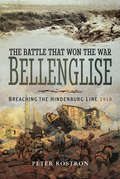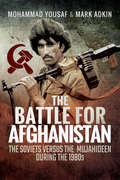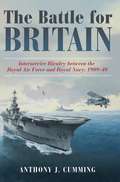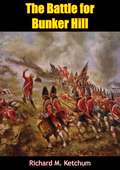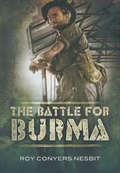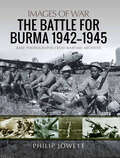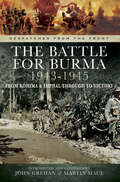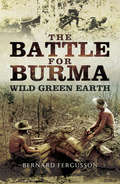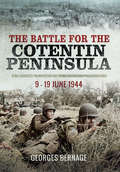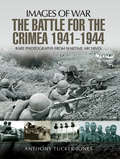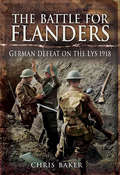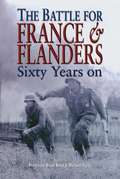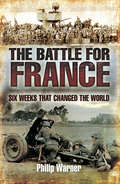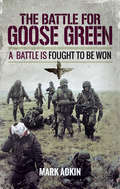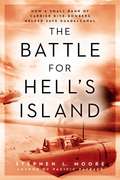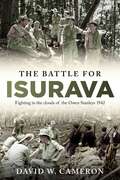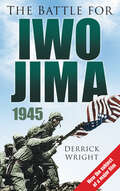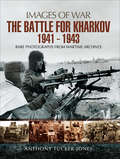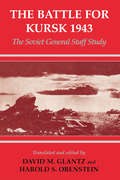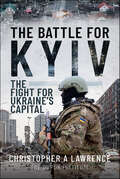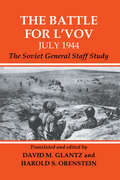- Table View
- List View
The Battle That Won the War: Breaching the Hindenburg Line, 1918
by Peter RostronIt is no exaggeration to claim that 46th North Midland Divisions action on 29 September 1918 was the hammer blow that shattered the will of the German High Command.Painting the strategic picture from early 1918 and the dark weeks following the Germans March offensive, the Author lays the ground for the Allied counter-strike. Ahead of them was the mighty Hindenburg Line, the Kaisers formidable defensive obstacle given added strength by the St Quentin Canal.Undaunted the Allies attacked using American, Australian and British formations. Led by Major General Boyd, 46 Division stormed the Canal and, thanks to a combination of sound planning and determined courageous fighting, seized their Hindenburg Line objective by the end of the day.The psychological damage to the German will, already weakened by the failure of the Spring offensive, is demonstrate by Ludendorffs collapse and opening of negotiations that led five weeks later to the Armistice.
The Battle for Afghanistan: The Soviets Versus the Majahideen During the 1980s
by Mark Adkin Mohammad YousafThis is the story of the defeat of Soviet Russia's forces in Afghanistan by a guerrilla force known as the Mujahideen, heavily backed by Pakistan and the USA. The Mujahideen paved the way for the Taliban regime, to exist having all but defeated the Russian Army in the late 80's.The author, Brigadier Mohammad Yousaf, was head of the Afghan Bureau of Pakistan's Inter-Service Intelligence and as such was effectively the Mujahideen's commander-in-chief. He controlled the flow of thousands of tons of arms across Pakistan and into its occupied neighbor, arms that were bought with CIA and Saudi Arabian funds from the USA. One of the Mujahideen's close allies was none other than Osama Bin Laden.This compelling book was put together with great skill the by military historian, Mark Adkin in conjunction with Brigadier Mohammad Yousaf and is essential reading for anyone interested in the truth behind the Afghanistan War which led to the conditions that exist there today.A hardback edition of this book was published by Casemate in 2001 under the title Afghanistan: The Bear Trap.
The Battle for Arnhem 1944–1945: Rare Photographs From Wartime Archives (Images of War)
by Anthony Tucker-JonesA photographic history of WWII&’s Operation Market Garden and the Allies&’ quest for the famed &“Bridge Too Far.&” Operation Market Garden, September 1944, the Netherlands. Three parachute drops and one armored charge. The prize was the last bridge at Arnhem over the Neder Rijn. Taken intact, it would provide the Allies with a backdoor into Germany—the famous &“Bridge Too Far.&” This was one of the most audacious and imaginative operations of the war, and it failed. Anthony Tucker-Jones&’s photographic history, with a sequence of almost 200 archive photographs accompanied by a detailed narrative, describes the landing of British and American parachutists and glider troops. At the same time, British tanks spearheaded a sixty-mile dash along &“Hell&’s Highway&” to link up with the lightly armed and heavily outnumbered airborne forces. Most books about the resulting battle concentrate on the struggle at Arnhem and the heroism of the British 1st Airborne Division. This book puts that episode in its wider context. In particular it focuses on the efforts of the US 101st and 82nd airborne divisions to hold off counterattacks by German battlegroups during the tanks&’ advance. The photographs give a dramatic insight into all sides of a remarkable but ill-fated operation which has fascinated historians and been the subject of controversy ever since. They also portray, as only photographs can, the men who were involved and the places and conditions in which the fighting took place.
The Battle for Britain
by Anthony J. CummingThe book is a short review of British air and naval power from 1909 -1940 and represents an attack upon "independent” airpower. When Bleriot became the first man to fly the English Channel in a heavier-than-air flying machine in 1909, it seemed to mark the beginning of a fundamental decline in British attitudes towards maritime defense. Exploiting prevalent invasion paranoia, press baron, Lord Northcliffe invited distinguished writers such as William Le Queue and H G Wells to write articles on the theme "We are no longer an Island”. Bleriot’s exploit encouraged the politicians to reassess how Britain would be defended in the future. An important government committee heard evidence that led directly to the forming of the Royal Flying Corps - an organization that initially included army and naval wings. Superficially, the Royal Navy was moving from strength to strength as it expanded in the naval arms race with Germany. The service remained in high public esteem but a section of the ruling Liberal party wanted money diverted for welfare - a new and powerful competitor for funds. The Two-Power Standard was quietly dropped in 1909 and the astronomical costs of battleship building forced the Navy to look for cheaper substitutes such as submarines and aircraft. A forceful critic of naval expenditure, Winston S. Churchill fostered the early development of airpower when he became First Lord in 1911 and continued to do so when out of office. The German air raids of 1917 panicked the wartime government into making an ill-considered merger of naval and army air arms that supported imaginative but untried theories of airpower. In 1938, a later government submitted to the national psychosis of bombing by allowing the Royal Air Force to be the only service to rearm without regard to the nation’s ability to afford it. In 1940, the contribution of the Royal Navy was minimized as Churchill praised the RAF for saving the nation from invasion in the Battle of Britain. As a result the RAF’s story has achieved an iconic status that is part of British national identity. Consequently, more important operations including the Dunkirk evacuation; Battle of the Atlantic; Battle of Mers El Kebir and the naval operations against the Italian fleet have been underrated and misunderstood. This ultimate justification of independent airpower continues to undermine understandings of maritime defense and may have skewed US and UK defense policies in the wrong direction for decades.
The Battle for Bunker Hill
by Richard M. KetchumBoston, 1775: A town occupied by General Thomas Gage's redcoats and groaning with Tory refugees from the Massachusetts countryside. Besieged for two months by a rabble in arms, the British decided to break out of town. American spies discovered their plans, and on the night of June 16, 1775, a thousand rebels marched out onto Charlestown peninsula and began digging a redoubt (not on Bunker Hill, which they had been ordered to fortify, but on Breeds Hill, well within cannon shot of the British batteries and ships). At daybreak, HMS Lively began firing. It was the opening round of a battle that saw unbelievable heroism and tragic blunders on both sides (a battle that marked a point of no return for England and her colonies), the beginning of all-out war.
The Battle for Bunker Hill: The Battle For Bunker Hill
by Richard M. KetchumBoston, 1775: A town occupied by General Thomas Gage’s redcoats and groaning with Tory refugees from the Massachusetts countryside. Besieged for two months by a rabble in arms, the British decided to break out of town. American spies discovered their plans, and on the night of June 16, 1775, a thousand rebels marched out onto Charlestown peninsula and began digging a redoubt (not on Bunker Hill, which they had been ordered to fortify, but on Breeds Hill, well within cannon shot of the British batteries and ships). At daybreak, HMS Lively began firing. It was the opening round of a battle that saw unbelievable heroism and tragic blunders on both sides (a battle that marked a point of no return for England and her colonies), the beginning of all-out war.With impeccable scholarship, Richard M. Ketchum’s 1962 book describes the historic setting and importance of the battle, analysing the character and motives, as well as the many blunders, of responsible leaders on both sides. He gives a detailed and fascinating depiction of the battle, recapturing in graphic style each witness account.
The Battle for Burma
by Roy Conyers NesbitThe struggle of British, Commonwealth and American-Chinese troops against the Japanese in Burma was one of the decisive campaigns of the Second World War. British India was threatened by the Japanese advance, the fate of the British Empire in the East hung in the balance. The tropical climate dense malarial jungle infested with vermin and swept by monsoon rains made the fighting, for both sides, a remarkable feat of arms. Yet the war in Burma rarely receives the attention it deserves. Roy C. Nesbit, in this highly illustrated account, traces the entire course of the campaign. In vivid detail he describes the British retreat and humiliation at the hands of the Japanese invaders in 1942. The Japanese were fanatical and trained in jungle warfare, well-equipped and backed with an overwhelming air power. The Allied response was to build up their forces on a massive scale eventually over 1,300,000 personnel were involved and to train them to fight in the jungle conditions. Their counter-offensive, launched in 1944, culminated in the battles at Imphal and Kohima which turned the course of the conflict, and the reconquest of Burma was achieved just before the atom bomb was dropped.
The Battle for Burma, 1942–1945: Rare Photographs From Wartime Archives (Images of War)
by Philip JowettThe battle for Burma during the Second World War was of vital importance to the Allies and the Japanese. The Allies fought to protect British India and force the Japanese out of Burma; the Japanese fought to defend the north-west flank of their newly conquered empire and aimed to strike at India where anti-British feeling was growing stronger. Yet the massive military efforts mounted by both sides during four years of war are often overshadowed by the campaigns in Europe, North Africa, the Pacific and China. Philip Jowett, using over 200 wartime photographs, many of them not published before, retells the story of the war in Burma in vivid detail, illustrating each phase of the fighting and showing all the forces involved – British, American, Chinese, Indian, Burmese as well as Japanese. His book is a fascinating introduction to one of the most extreme, but least reported, struggles of the entire war. The narrative and the striking photographs carry the reader through each of the major phases of the conflict, from the humiliation of the initial British defeat in 1942 and retreat into India and their faltering attempts to recover the initiative from 1943, to the famous Chindit raids behind Japanese lines, the Japanese offensive of 1944 and their disastrous retreat and ultimate defeat.
The Battle for Burma, 1943–1945: From Kohima & Imphal Through to Victory (Despatches from the Front)
by Martin Mace John GrehanDespatches in this volume include that on operations in Burma and North-East India between November 1943 and June 1944, by General Sir George J. Giffard; the despatch on operations in Assam and Burma between June 1944 June and November 1944, by General Sir George J. Giffard, Commander-in-Chief; the despatch on Naval operations in the Ramree Island area (Burma) in January and February 1945 by Vice-Admiral Sir Arthur J. Power, Commander-in-Chief, East Indies Station; and the despatch on operations in Burma between November 1944 and August 1945 by Lieutenant-General Sir Oliver Leese.This unique collection of original documents will prove to be an invaluable resource for historians, students and all those interested in what was one of the most significant periods in British military history.
The Battle for Burma: Wild Green Earth
by Bernard FergussonBernard Fergusson was one of Orde Wingate's Column Commanders in the heroic but battered Chindit expedition behind Japanese lines in Burma in 1943. By 1944 Wingate had persuaded Churchill and Roosevelt that a bigger force, on the same unorthodox lines, could make a strategic difference. Aged 32, Fergusson returned to Burma as part of this, as a Brigadier, leading the only Brigade in the new force which entered Burma on foot. It was one of four Brigades which established well-defended strongholds within Japanese-occupied Burma. Fergusson also reflects candidly, and often humorously, on different aspects of the campaign. These include the ingenuity and sheer courage of the US Army Air Force pilots who flew in supplies and evacuated wounded. One glider pilot whom Fergusson saw making a particularly bad landing turned out to be Jackie Coogan, child star of Chaplin's The Kid, and later known as Uncle Fenster of the Addams Family. In apparently light hearted, but often profound sections, he analyses the management of a large and diverse force, up against physical extremes far from normal amenities and command structures; the importance of maintaining morale and of medical management; and, not least, an immediate portrait of Wingate himself, whose death at a crucial stage of the campaign and the conflicting or at least confusing orders he left behind directly affected Fergusson's men and the fate of the campaign.The Wild Green Earth follows the author's account of the 1943 campaign, Beyond the Chindwin. Both were written with the events, and reactions even the smells fresh in the author's mind, and vividly but sensitively conveyed. The excitement of the narrative remains today. And the reflections are timeless, fascinating for those with an interest in leadership and motivation as much as for readers of military history.
The Battle for Cotentin Peninsula: 9–19 June 1944
by Georges BernageIn June 1944, the Americans left the Sainte-Mre-Eglise and Utah Beach bridgehead and crossed the Merderet river to the Chausse de la Fiere, taking Picauville on 10 June. Their advance was slowed following the failure of the 90th Infantry Division, but they were able to take Pont-l'Abbe on 12 June and Saint-Sauveur-le-Vicomte 16 June. Two days later they cut the Cotentin peninsula at Barneville, before heading north towards Cherbourg.As well as authentic eyewitness testimony, the book also acts as a field guide, including maps and both contemporary and modern photographs.
The Battle for Crimea, 1941–1944 (Images of War)
by Anthony Tucker-JonesThe selection of over 150 rare wartime photographs in this volume in Pen & Swords Images of War series offers a graphic visual record of the dramatic and bloody battles fought for the Crimea during the Second World War. They show every grim aspect of the fighting and reflect in many ways the ruthless character of the struggle across the entire Eastern Front. The German-led Axis forces took eight months to conquer the Crimea in 1941-2 the Soviet defenders of the fortified city-port of Sevastopol held out against repeated assaults for 250 days. In 1944, after the course of the war had turned against the Wehrmacht and their allies, the city was liberated by the Red Army, but only after over 120,000 Axis troops had been evacuated across the Black Sea. Naval operations involving the Soviet Black Sea Fleet and the Romanian Royal Navy are covered in the book, as is the battle in the air between the Luftwaffe and the Red Air Force. But perhaps the most memorable photographs give an insight into the ordinary soldiers experience of the fighting and show the enormous material damage the conflict left behind.
The Battle for Flanders: German Defeat on the Lys 1918
by Chris BakerThe Battle of the Lys, fought in April 1918, was critical for the Allies and for Germany. The outcome of the Great War hung in the balance. After the successful German offensive on the Somme, their breakthrough on the Lys threatened Ypres and the British hold on Flanders and brought them close to victory on the Western Front. The Allied line was broken it was only saved by improvisation and great gallantry—and the German onslaught tested Allied cooperation under the newly appointed Generalissimo Ferdinand Foch to the limit. Yet, as Chris Baker shows in this compelling account, the declining force of the German attack revealed deficiencies in material, organization and morale that led to their ultimate defeat.
The Battle for France & Flanders: Sixty Years On (Military History Ser.)
by Michael Taylor Brian BondThe Fall of France in 1940 has been well chronicled but numerous misconceptions remain.This fascinating and thought-provoking collection of essays on wide-ranging issues covering the politics and fighting on land, sea and in the air will be greatly welcomed by academics and military history enthusiasts.Topics covered include the preparations of the BEF, the failure of allied counter attacks, the air war, the Royal Navys's role in the campaign, the influence of the Battle on British military doctrine and the repercussions from the British, French and German angles.
The Battle for France: Six Weeks That Changed The World
by Philip Warner“Provides a fresh and invaluable explanation of the military and political events of that extraordinary campaign.” —Scale Military Modeller InternationalAfter the long winter of the Phoney War, the invasion of the Low Countries and France by Hitler’s rampaging armies threw the world into crisis. Chamberlain’s government fell, Churchill became Prime Minister. France was humiliated, the British Expeditionary Force was only saved by the miracle of Dunkirk but many men and huge amounts of equipment were lost to the Blitzkrieg. England trembled but the invasion never came.Philip Warner graphically recounts the momentous events of that terrible period thanks to his painstaking research and skillful writing. He demonstrates how the under trained and ill-equipped British forces gallantly but futilely resisted the German land and air onslaught. He emphasizes the understated contribution of the French. This book provides a fresh and invaluable explanation of the military and political events of that extraordinary campaign, which continued on after Dunkirk.
The Battle for Goose Green: A Battle is Fought to be Won (Cassell Military Paperbacks Series)
by Mark Adkin&“Probably the best and most detailed description of a key battle in the 1982 Falklands War . . . an excellent and fast paced narrative.&” —Michael McCarthy, historical battlefield guide This book tells the story of the battle for Goose Green—the first crucial clash of the Falklands War—through the eyes of the commanders, both British and Argentine, from brigadier to corporal. It follows in detail, with the aid of maps, the fourteen hours of vicious infantry as both sides struggled for the tiny settlement of Goose Green. The book explains how 2 Para came close to failure as the battalion fought over open ground, in daylight, without adequate fire support against prepared positions. Controversial questions—such as: Was it an unnecessary battle? Why did London overrule the brigadier commander&’s reluctance to attack? Did Col. Jones&’s solo charge, which won him the Victoria Cross, decide the issue?—are discussed frankly. The author, himself a former infantry officer, has had the full support of the Parachute Regiment, and has assembled the views and comments of over forty-five veterans of all ranks who fought there. &“The Falklands War showed British military personnel at their best and most innovative under the most testing of conditions, and the Battle of Goose Green was one of the classic actions . . . The author has made an impressive job of reviewing the important factors, the events and decisions that led to the battle.&” —Firetrench &“This brought home to me how the infantry fight and how the British Paratrooper has gained a worldwide reputation for being one of the best fighting men around. A superb read.&” —Army Rumour Service
The Battle for Hell's Island
by Stephen L. MooreFrom the author of Pacific Payback comes the gripping true story of the Cactus Air Force and how this rugged crew of Dive-Bombers helped save Guadalcanal and won the war.November 1942: Japanese and American forces have been fighting for control of Guadalcanal, a small but pivotal island in Japan's expansion through the South Pacific. Both sides have endured months of grueling battle under the worst circumstances: hellish jungles, meager rations, and tropical diseases, which have taken a severe mental and physical toll on the combatants. The Japanese call Guadalcanal Jigoku no Jima--Hell's Island.Amid a seeming stalemate, a small group of U.S. Navy dive bombers are called upon to help determine the island's fate. The men have until recently been serving in their respective squadrons aboard the USS Lexington and the USS Yorktown, fighting in the thick of the Pacific War's aerial battles. Their skills have been honed to a fine edge, even as injury and death inexorably have depleted their ranks. When their carriers are lost, many of the men end up on the USS Enterprise. Battle damage to that carrier then forces them from their home at sea to operating from Henderson Field, a small dirt-and-gravel airstrip on Guadalcanal.With some Marine and Army Air Force planes, they help form the Cactus Air Force, a motley assemblage of fliers tasked with holding the line while making dangerous flights from their jungle airfield. Pounded by daily Japanese air assaults, nightly warship bombardments, and sniper attacks from the jungle, pilots and gunners rarely last more than a few weeks before succumbing to tropical ailments, injury, exhaustion, and death. But when the Japanese launch a final offensive to take the island once and for all, these dive-bomber jocks answer the call of duty--and try to perform miracles in turning back an enemy warship armada, a host of fighter planes, and a convoy of troop transports.A remarkable story of grit, guts, and heroism, The Battle for Hell's Island reveals how command of the South Pacific, and the outcome of the Pacific War, depended on control of a single dirt airstrip--and the small group of battle-weary aviators sent to protect it with their lives.
The Battle for Hell's Island: How a Small Band of Carrier Dive-Bombers Helped Save Guadalcanal
by Stephen L. MooreFrom the author of Pacific Payback comes the gripping true story of the Cactus Air Force and how this rugged crew of Dive-Bombers helped save Guadalcanal and won the war.November 1942: Japanese and American forces have been fighting for control of Guadalcanal, a small but pivotal island in Japan's expansion through the South Pacific. Both sides have endured months of grueling battle under the worst circumstances: hellish jungles, meager rations, and tropical diseases, which have taken a severe mental and physical toll on the combatants. The Japanese call Guadalcanal Jigoku no Jima--Hell's Island.Amid a seeming stalemate, a small group of U.S. Navy dive bombers are called upon to help determine the island's fate. The men have until recently been serving in their respective squadrons aboard the USS Lexington and the USS Yorktown, fighting in the thick of the Pacific War's aerial battles. Their skills have been honed to a fine edge, even as injury and death inexorably have depleted their ranks. When their carriers are lost, many of the men end up on the USS Enterprise. Battle damage to that carrier then forces them from their home at sea to operating from Henderson Field, a small dirt-and-gravel airstrip on Guadalcanal.With some Marine and Army Air Force planes, they help form the Cactus Air Force, a motley assemblage of fliers tasked with holding the line while making dangerous flights from their jungle airfield. Pounded by daily Japanese air assaults, nightly warship bombardments, and sniper attacks from the jungle, pilots and gunners rarely last more than a few weeks before succumbing to tropical ailments, injury, exhaustion, and death. But when the Japanese launch a final offensive to take the island once and for all, these dive-bomber jocks answer the call of duty--and try to perform miracles in turning back an enemy warship armada, a host of fighter planes, and a convoy of troop transports.A remarkable story of grit, guts, and heroism, The Battle for Hell's Island reveals how command of the South Pacific, and the outcome of the Pacific War, depended on control of a single dirt airstrip--and the small group of battle-weary aviators sent to protect it with their lives.
The Battle for Isurava: Fighting in the clouds of the Owen Stanley 1942
by David W. CameronWithin 24 hours of the Japanese invasion of northern New Guinea at Gona in July 1942, the Australian militiamen of &‘B&’ Company, 39th Battalion, spent four weeks fighting a delaying action against a crack Japanese force outnumbered by three to one. By mid-August, the rest of the battalion had arrived, and these men took up a position at Isurava, in the heart of the cloud covered mountains and jungles of the Owen Stanley Range. At Isurava, this small militia force of the 39th Battalion now numbering around 300 men was determined to make a stand against a crack Japanese force of the 144th Regiment and supporting elements, numbering at least 1500. Then on the day the Japanese launched their attack, to the great relief of these militiamen, reinforcements from the 2nd AIF who had fought with great distinction in the Middle East began to arrive in the afternoon having spent days struggling up the track from Port Moresby. Even so, the Australians were still outnumbered, as the Japanese also received reinforcements, and unlike the Japanese, the Australians had no supporting artillery or medium machineguns. The battle for Isurava would be the defining battle of the Kokoda Campaign and has rightfully been described as Australia&’s Thermopylae. It was here that Australia&’s first Victoria Cross in the Pacific war was awarded when the Japanese conducted several ferocious attacks against the Australian perimetre. Private Bruce Kingsbury led an Australian counterattack, rushing forward sweeping the Japanese positions with his Bren gun, saving he situation when all seemed lost — he was killed leading the charge. Another two men were also nominated for the VC during the fighting at Isurava. The outnumbered and poorly equipped Australians managed to hold back the Japanese advance for almost a week; only then did these battle scared and weary men begin a month long fighting withdraw towards Ioribaiwa Ridge just north of Port Morsby. However, their sacrifice provided time for the Australian 25th Brigade to be brought forward — finally forcing the Japanese to withdrawal just as they glimpsed the lights of Port Morseby.
The Battle for Iwo Jima (Cornerstones of Freedom)
by Tom McgowenRelates the events preceding, during, and after the battle for the tiny Japanese island of Iwo Jima, where American victory hastened the end of World War II.
The Battle for Iwo Jima 1945
by Derrick WrightIwo Jima was the United States Marine Corps' toughest ever battle and a turning point in the Pacific War. In February 1945, three Marine Divisions stormed the island's shores in what was supposed to be a ten-day battle, but they had reckoned without General Tadamichi Kuribayashi, the enemy commander.
The Battle for Kharkov, 1941–1943 (Images of War)
by Anthony Tucker-JonesA pictorial history of a series of World War II battles between the Soviet Red Army and the Nazi Wehrmacht around a city in present-day Ukraine. The four battles fought for Kharkov during the Second World War are often overshadowed by the battles for Moscow, Leningrad, and Stalingrad, yet they were critical stages in the struggle between the Wehrmacht and the Red Army for control of the southern Soviet Union. Anthony Tucker-Jones, in this volume in the Images of War series, offers a visual record of the dramatic and bloody conflict that took place there, showing every grim aspect of the fighting. Kharkov became one of the most bitterly contested cities during the war on the Eastern Front, and this book presents a graphic overview of the atrocious conditions the soldiers on both sides had to endure. In 1941 Kharkov fell to Hitler&’s Army Group South. In 1942 the Soviets tried and failed to retake it, losing 240,000 men in the Barvenkovo Bulge. Then, in 1943, the control of the battered city changed hands twice before the Soviets liberated it for good. The fate of Kharkov during the war reflects the history of the wider struggle between Hitler&’s Germany and Stalin&’s Soviet Union.Praise for Battle for Kharkov&“The collection of original un-published Scott Pick photos are exceptional with such quality and topic coverage that the material visually jumps off the pages. . . . Presents a hard hitting and furious review of the period. . . . The ability of the author to cover the lengthy period in a concise review is very solid, and creates a substantial quality of information versus time of reading commitment.&” —Richard Wade, military historian
The Battle for Kursk, 1943: The Soviet General Staff Study (Soviet (Russian) Study of War)
by DAVID M. GLANTZ; HAROLD S. ORENSTEINThis volume offers detailed information about the Red Army's preparation for and conduct of the Battle of Kursk, the nature of the war on the German Eastern Front, and on the range of horrors that have characterized warfare in the 20th century.
The Battle for Kyiv: The Fight for Ukraine’s Capital
by Christopher A. LawrenceThe story of the heroic resilience of the Ukrainians against the military forces of a country with more than three times its population. On 24 February 2022, the President of Russia, Vladimir Putin, unleashed an attack on Ukraine that developed into the most significant conflict in Europe since the Second World War. Fought over the same ground that the Germans and the Soviet Union battled on between 1941 and 1944, Russia attempted to advance to the Ukrainian capital of Kyiv and replace its president, Volodymyr Zelenskyy, with a puppet regime. Facing determined resistance, the Russians failed to reach the city, being compelled to withdraw and redirect their forces to other fronts. The Battle of Kyiv tells the story of the heroic resilience of the Ukrainians over the military forces of a country which has more than three times its population and an economy almost ten times larger. This book is also an analysis of the enormous support given to Ukraine, both politically and militarily, by NATO and other nations, without which Ukraine’s military might have failed to beat back the invaders. The author explores the first phase of the war, during which Russian armor, mechanized and air mobile troops drove on Kyiv, surrounded Chernigov, seized Kherson twice, and threatened the very existence of the Ukrainian state. The United States’ intelligence services estimated that the Russians would seize Kyiv within three days. They offered to evacuate President Zelensky back to Lvov. His alleged response to the Americans was: ‘I need ammunition, not a ride.’ He and his government stayed in Kyiv and the battle lines were drawn. The Russians continued their offensive. As well as bearing down on Kyiv and Kherson, Putin’s troops also threatened Chernigov, Sumy, Kharkov, Mykolaiv, and the beleaguered port city of Mariupol. This book covers all the fighting for these areas up until Russia’s subsequent withdraw from the region around Kyiv. It addresses the military operations on the ground, the destruction of the buildings and the Ukrainian infrastructure, the suffering of the civilian population and the day-by-day struggles for survival. Writing as the battle raged on, the author examines the conflict with an unparalleled immediacy and poignancy. This also means that The Battle of Kyiv is an important historical document, reflecting not subsequent outcomes, but depicting the uncertainty and anxiety faced not just by the contesting forces, but by the rest of the world as the result of the war in Ukraine hung in the balance.
The Battle for L'vov July 1944: The Soviet General Staff Study (Soviet (Russian) Study of War #No. 13)
by Harold S. Orenstein David M. GlantzThe Red Army's summer offensive of 1944 against Hitler's Wehrmacht was unprecedented in terms of its scale, scope, and strategic intent and impact. This study details how the Red Army accomplished this feat in the words of those individuals who planned and orchestrated the offensive.
